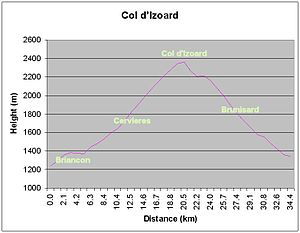Col d'Izoard
| Col d'Izoard | |
|---|---|
 Memorial at the top of Col d'Izoard | |
| Elevation | 2,360 m (7,743 ft)[1] |
| Traversed by | D902 |
| Location | Hautes-Alpes, France |
| Range | Alps |
| Coordinates | 44°49′11″N 06°44′06″E / 44.81972°N 6.73500°E |
Col d'Izoard (2,360 m (7,743 ft)) is a mountain pass in the Alps in the department of Hautes-Alpes in France.
It is accessible in summer via the D902 road, connecting Briançon on the north and the valley of the Guil in Queyras, which ends at Guillestre in the south. There are forbidding and barren scree slopes with protruding pinnacles of weathered rock on the upper south side. Known as the Casse Déserte, this area has formed a dramatic backdrop to some key moments in the Tour de France and at times in the Giro d'Italia, and often featured in iconic 1950s black-and-white photos of the race.[2][3]
Cycle racing
Details of the climb

From the south, the climb starts at Guillestre from where it is 31.5 km (19.6 mi) in length, at an average gradient of 4.8%. The climb proper starts at the junction with the D947, near Chateau Queyras from where the ascent is 15.9 km (9.9 mi) long.[2] Over this distance, the climb gains 1,095 m (3,593 ft) at an average of 6.9% and a maximum sustained gradient of 10%.[4]
The climb from Briançon, to the north-west, via Cervières to the col is 19 km (11.8 mi) in length, climbing 1,105 m (3,625 ft) at an average gradient of 5.8% and a maximum gradient of 8.9%.[5]
On both sides mountain pass cycling milestones are placed every kilometre. They indicate the current height, the height of the summit, the distance to the summit, as well as the average slope in the following kilometre.
In general, the col is closed from October to early June.
Tour de France
The Col d'Izoard is frequently on the route of the Tour de France, where it is frequently classified as an Hors Categorie climb.[6][7] Warren Barguil won the 2017 Tour de France's Stage 18, becoming the first cyclist to win a Tour de France stage that finished on the Col d'Izoard – it has been on the route 34 times previously in the Tour de France since 1922 but never before had a stage finished there.[8]
Several of the Tour de France's more memorable moments have occurred on the Col d'Izoard, particularly the exploits of Gino Bartali, Fausto Coppi, Louison Bobet and Bernard Thévenet. A small cycling museum is at the summit, along with a memorial to Coppi and Bobet.


Appearances in the Tour de France
Giro d'Italia
The Col d'Izoard was 7 times on the route of the Giro d'Italia.[9] The most famous passage over the Col was in 1949, when Coppi beat Bartali in the memorable stage from Cuneo to Pinerolo, taking the pink jersey.
Appearances in the Giro d'Italia
| Year | Stage | Start | Finish | Leader at the summit |
|---|---|---|---|---|
| 2007 | 12 | Scalenghe | Briançon | |
| 2000 | 19 | Saluzzo | Briançon | |
| 1996 | 14 | Santuario di Vicoforte | Briançon | |
| 1994 | 20 | Cuneo | Les Deux Alpes | |
| 1982 | 21 | Cuneo | Pinerolo | |
| 1964 | 20 | Cuneo | Pinerolo | |
| 1949 | 17 | Cuneo | Pinerolo |
See also
References
- ^ IGN map
- ^ a b "Col d'Izoard – 2360 metres". Grenoble Cycling. Archived from the original on 28 September 2013. Retrieved 24 September 2013.
- ^ Université Libre de Bruxelles
- ^ "Col de l'Izoard: Guillestre". www.climbbybike.com. Retrieved 21 July 2014.
- ^ "Col de l'Izoard: Briançon". www.climbbybike.com. Retrieved 21 July 2014.
- ^ "Le col d'Izoard dans le Tour de France depuis 1947" (in French). ledicodutour. Retrieved 24 July 2022.
- ^ "Complete list of crossings". Le Col d'Izoard. www.memoire-du-cyclisme.eu. Archived from the original on 27 September 2013. Retrieved 24 September 2013.
- ^ "Tour de France 2017: Chris Froome in control, Warren Barguil wins stage 18". BBC. 20 July 2017.
- ^ "Salite da scoprire: Col de l'Izoard" (in Italian). Sport Folks. 1 July 2017. Retrieved 24 October 2023.
Further reading
- Bacon, Ellis (2014). Mapping Le Tour. Glasgow: HarperCollins Publishers. pp. 284–285. ISBN 9780007543991. OCLC 872700415.
External links
- Col d'Izoard on Google Maps (Tour de France classic climbs)
- Cycling up to the Col d'Izoard: data, profile, map, photos and description Archived 2016-12-22 at the Wayback Machine


